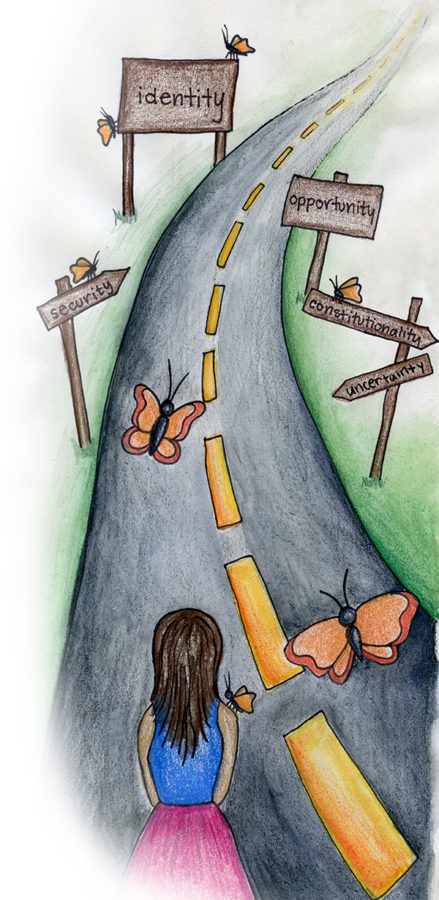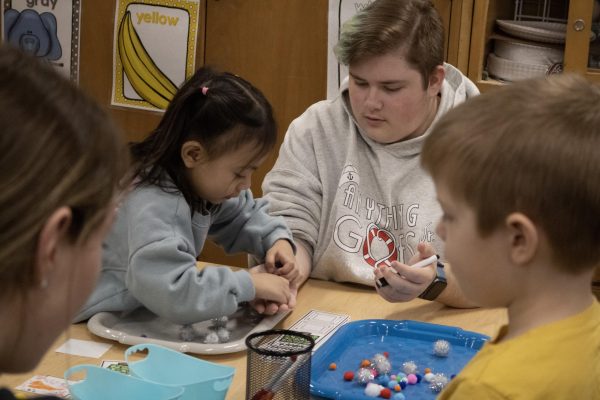Deferred Action for Childhood Arrivals (DACA): opinions, impacts throughout South
October 6, 2017
What’s at stake: the futures of nearly 800,000 young Americans. On Sept. 5, a consensus was reached by the Trump administration on the status of Deferred Action for Childhood Arrivals (DACA); the current program will end in the next six months, but will be revisited and revised by Congress. According to counselor Socorro Rogers, GBS students are both affected and concerned about the program’s remaining six months in existence.
Rogers said that she, along with her Student Services colleagues, works with students under DACA to help guide them to take the appropriate steps in light of the Trump administration’s decision to repeal the program. Rogers explained that DACA essentially gives undocumented minors the ability to be educated, work and live in the United States.
“[DACA is] something passed during the Obama administration [that] was designed to help children of immigrants stay in the United States and defer any deportation whatsoever so they could work legally,” Rogers said. “It allowed them the opportunity to be safe in the United States, work [and to go to school.]”
According to junior Gabriela Ramos*, her parents brought her to America illegally at the age of six from Mexico. Ramos says she is not registered but was interested in enrolling in DACA since its release under the Obama administration because it provided a future for her that would otherwise be very difficult to achieve as an undocumented immigrant.
“DACA is a chance to actually become something and have the opportunity to succeed in a place you are not familiar with,” Ramos said.
However, Ramos says she recently learned that Trump’s decision to end the program altered the future that she hoped for. The reality truly settled in when lawyers gave her the final conclusion she said she dreaded.
“When I went into that room [with the lawyers] I knew what was going to happen but I didn’t have the mentality ready,” Ramos said. “I walked in and they said there was no chance [of enrolling in DACA] and they were very straightforward. In a way, it hurt my feelings and I was pretty emotional.”
Rogers explained that with the repeal of DACA comes a question of how undocumented immigrant students will continue their higher education. According to the National Conference of State Legislatures, sixteen state legislatures including Illinois, have enacted laws allowing in-state tuition benefits to certain immigrant students seeking college degrees despite their citizenship status.
“If you’re a student who is not here legally, you don’t qualify for any financial assistance, [but] college is always on the table,” Rogers said. “Senate Bill [HB60] allows students in Illinois especially to attend school regardless of their status in the U.S. So it makes me sad to see that kids who don’t know any country but the United States and call it their own stripped of that opportunity.”
According to senior Arij Virani, she is also concerned about the diminishing opportunities for higher education for undocumented immigrant students. She sees the termination of DACA as heartbreaking and explained she has family and friends who rely on DACA to attend college and now they might be deprived of that assistance.
“I think [the termination is] a scary thought to think about especially with college and things coming around the corner,” Virani said. “Being in college, they’re already not getting scholarships to be able to pay, and some people are going to really good institutions which is 60 [to] 70 grand a year. For someone [like myself] who is literally not being affected or being hurt by these people to take away that opportunity and make them pay 60 [to] 70 grand a year for school that they can’t even go to anymore is really sad.”
Similar to Virani, senior Emily Mikuta has immigrant family members, mainly from Poland, who are affected by DACA’s repeal. Her cousin, a University of Illinois graduate and business owner, was formerly registered under DACA which enabled her to earn her degree and enter the workforce. According to Mikuta, her cousin is currently back in the Chicagoland area spending time with family until her future becomes more concrete.
“[My family and I] had a dinner at my house […] and we all cried,” Mikuta said. “My cousin said that she does not want all of her work to go to waste because she worked so hard through college and has her own business. Everybody left at 2 a.m. because we could not say goodbye.”
According to Mikuta, the future of her cousin is ambiguous and the hardest part is the uneasiness that accompanies the waiting period for a final decision by the Trump administration on the DACA program.
“That’s the scariest part, she’s [waiting for an answer],” Mikuta said. “We keep looking. Has Trump made his decision? Has he reached the solution? It’s a waiting game.”
Lesly Zavala, Students Organized Against Racism (SOAR) senior leader, advocates for minorities at GBS and beyond. Zavala says their mission is to promote awareness of the opinions of minorities where they might not be heard otherwise.
“South is [somewhat] of a diverse school, but it seems more diverse because the schools around it are [not] […] but [there is racism everywhere],” Zavala said. “There are different forms of racism and [we just want to inform] and show the community, especially the [less diverse] suburbs over here. We just want to show them that there are minorities, we exist, we have a say in what’s happening and we want you to hear us.”
Belonging to a minority population, Zavala feels that Trump’s statement of DACA’s dissolution is polarizing.
“I’m not under DACA, I don’t need it luckily,” Zavala said. “I’m a citizen but even I feel alienated after Donald Trump took office. I feel alienated in my community and I can imagine how a DACA or former DACA student would feel after this; in my eyes it feels like [the administration is] just trying to push them as far into a corner as possible.”
On the other hand, senior Julia Jakubiak has had concerns about the legitimacy of DACA since the Obama administration passed it in 2012.
“The first thought I had […] when President Obama enacted it was how […] possible is it for the president to really extend [his powers] and do something like that,” Jakubiak said. “Is it constitutional? Is it the right of a president to create something like this that has such a wide impact over so many hundreds of thousands of people? It’s not that I really have a problem with the message itself or what they’re trying to do, it’s really more of the legal stuff behind it.”
Senior Peter Pys says he too questioned DACA’s constitutionality but also its effect on the American people who were citizens and unable to receive the benefits that a citizen should.
“What annoyed me [about the creation of DACA] was that there’s tons of veterans and people that are actual American citizens that are suffering because they aren’t covered by their insurance
or just don’t have the money,” Pys said. “It was frustrating to see that people who have fought for our country and did so much weren’t getting prioritized and illegal aliens were.”
According to Jakubiak, the inability of Congress to act on many prominent issues is worrisome. Jakubiak says that the status of DACA is important for Congress to address and requires sufficient time and effort to solve.
“I know that President Trump said that he’ll give Congress until the end of [the next six months] to figure out an alternative,” Jakubiak said. “I think that it’s gonna be really hard to do that because Congress has a lot of other things like health care, [and the issue of] social divide in the country and this list of other things and other pressures that are being put onto them.”
According to Rogers, she said that one of the most important aspects of her job within the Student Services Department is to cultivate an accepting environment for kids to attend school in. She explained that her job puts her in contact with students ranging in different personal issues and that the job of a public institution like GBS is to strive to connect all kids to appropriate resources for their lives.
“We build community by helping all students, so we build community by being accepting of a student who maybe lost or broke their Chromebook, [or of] a student who is feeling unsafe in the building because they don’t know what their future holds,” Rogers said. “We welcome every kid with open arms and we are here as a resource to provide them with any help and support they need. It’s a public school so in a public setting like GBS we’re here to help all kids regardless of our political affiliations.”
*names have been changed












